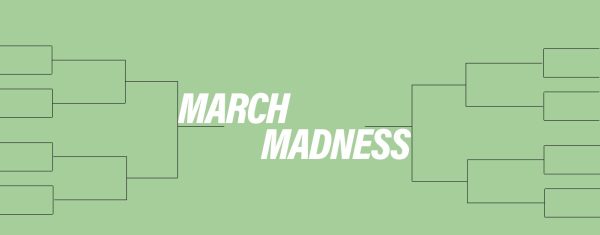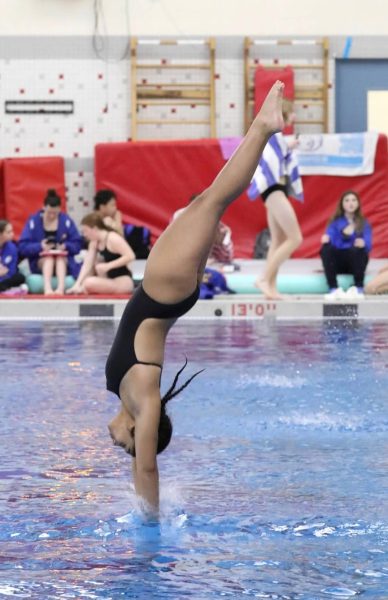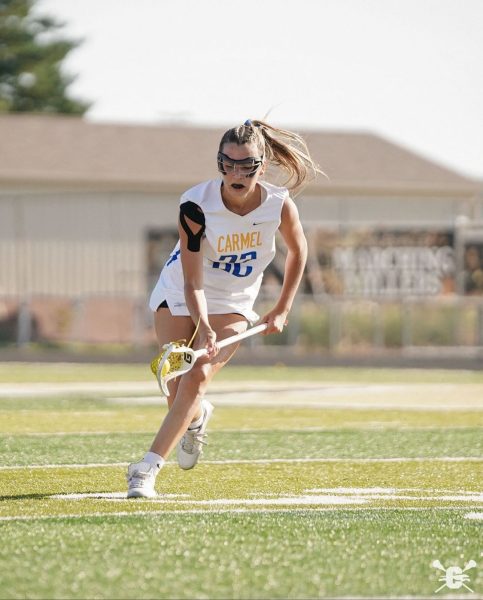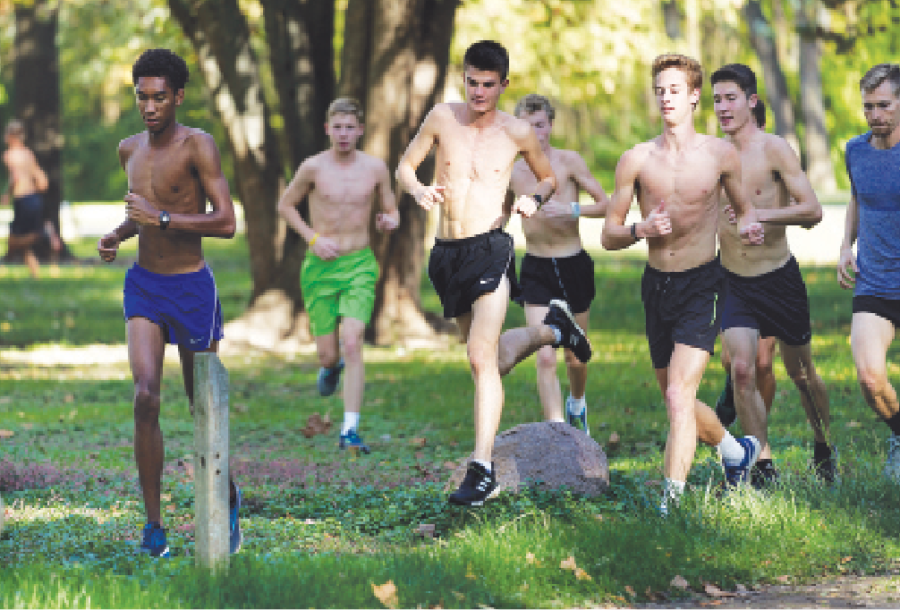CHS student athletes reflect on how scheduling affects their seasons
The varsity women’s swimming and diving team has won 31 consecutive state championships, but according to Gabriela Nieves, varsity swimmer and junior, said, although CHS has won 31 consecutive state championships, the team still faces competition. Nieves said Hamilton Southeastern High School, and in the past year Westfield High School, have been the team’s top competitors.
It is this type of schedule—regularly competing against different teams in the state during the regular season—that can give teams like Carmel an edge when tournament time comes around.
“We compete a lot with our neighboring schools like Noblesville, Westfield and Fishers. It gets repetitive because we know the same people and we want fresh blood. That being said, it also makes (competing) easier because we know what to expect,” she said.
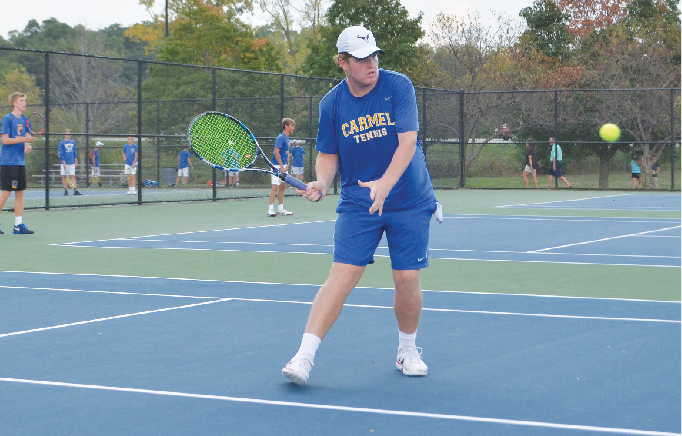
Patrick Fletchall, varsity tennis player and senior, hits the ball in a game against Homestead High School. Fletchall said there isn’t much competition in Indiana and there is a noticeable difference between small schools and big schools.
Agrayan Gupta | Photo
According to Keelan Grant, varsity men’s cross-country runner and senior, scheduling impacts teams greatly since it gives athletes an important perspective on how well they perform compared to other teams in the state.
For example, Grant said last year when the cross-country team only got to compete against last year’s state champion, Carroll High School, once or twice, but this year they were able to compete against them earlier in the season.
The men’s cross-country team won this year’s Semistate on Oct. 21. Grant said the team’s success can be partially attributed to scheduling.
“Most teams that are making it out of semi-state came from our regional meet. Knowing what teams are going to be there and who could contend with us, we were confident in our abilities going into semi-state and that lead us to excel,” Grant said.
According to Colin Altevogt, head coach of the men’s cross-country team, the cross-country team runs a strong schedule which helps the team. He said the team has ways to compare performances to other teams when they are not able to compete with them for a period of time. He said there are 12 runners on the roster, but only seven are allowed to run at a time, so the top two runners (senior Colin Murphy and Grant) get some time off since they will compete in the State meet. Altevogt said even though only seven runners can participate at State, at least 10 runners are allowed to participate in tournaments—in other words, all the meets until the Sectional meet. According to Altevogt, it is this option that keeps the team strong for future seasons and not just the current season.
“We purposely go to meets (where) we can run more than 10 runners because next year, our top four guys are going to graduate, so then those other guys will have experience in varsity races as well. Since our team is so big, our eighth to 12th guys are so much better than most of the other eighth to 12th guys that it’s such an advantage for them to run in varsity. Then, when they’re older- so when they’re juniors and seniors and they’re in the top seven—the fact that they’ve run in varsity races as sophomores is a huge advantage,” Altevogt said.
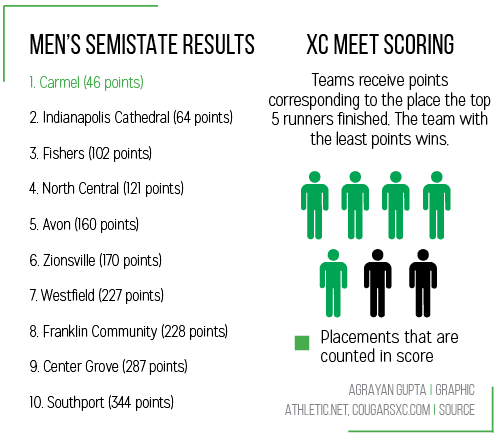
Patrick Fletchall, varsity men’s tennis player and senior, said North Central High School was the team’s main competition this year. It’s a team Carmel faced and beat in August and again in September before defeating the Panthers in the tournament State on Oct. 13. Fletchall said regularly playing against large schools like North Central gives CHS a competitive advantage.
“There’s definitely a drop-off (in) level between smaller schools and bigger schools, so when you play the smaller schools there’s definitely a lot less competition. The bigger schools make us better and we make them better because we’re used to playing them, and bigger schools are better overall,” Fletchall said. “I think the strength of scheduling impacts us pretty well, because as Carmel, we always play the top schools so we’ve always dealt with the most pressure. We get to play against better teams.
“I think our schedule ultimately prepared us for the big matches versus teams like North Central and Park Tudor,” Fletchall added. “And we got to experience those types of matches all season long, allowing us to adapt to the State-run matches.”
Your donation will support the student journalists of Carmel High School - IN. Your contribution will allow us to purchase equipment and cover our annual website hosting costs.

































![AI in films like "The Brutalist" is convenient, but shouldn’t take priority [opinion]](https://hilite.org/wp-content/uploads/2025/02/catherine-cover-1200x471.jpg)









































![Review: “The Immortal Soul Salvage Yard:” A criminally underrated poetry collection [MUSE]](https://hilite.org/wp-content/uploads/2025/03/71cju6TvqmL._AC_UF10001000_QL80_.jpg)
![Review: "Dog Man" is Unapologetically Chaotic [MUSE]](https://hilite.org/wp-content/uploads/2025/03/dogman-1200x700.jpg)
![Review: "Ne Zha 2": The WeChat family reunion I didn’t know I needed [MUSE]](https://hilite.org/wp-content/uploads/2025/03/unnamed-4.png)
![Review in Print: Maripaz Villar brings a delightfully unique style to the world of WEBTOON [MUSE]](https://hilite.org/wp-content/uploads/2023/12/maripazcover-1200x960.jpg)
![Review: “The Sword of Kaigen” is a masterpiece [MUSE]](https://hilite.org/wp-content/uploads/2023/11/Screenshot-2023-11-26-201051.png)
![Review: Gateron Oil Kings, great linear switches, okay price [MUSE]](https://hilite.org/wp-content/uploads/2023/11/Screenshot-2023-11-26-200553.png)
![Review: “A Haunting in Venice” is a significant improvement from other Agatha Christie adaptations [MUSE]](https://hilite.org/wp-content/uploads/2023/11/e7ee2938a6d422669771bce6d8088521.jpg)
![Review: A Thanksgiving story from elementary school, still just as interesting [MUSE]](https://hilite.org/wp-content/uploads/2023/11/Screenshot-2023-11-26-195514-987x1200.png)
![Review: "When I Fly Towards You", cute, uplifting youth drama [MUSE]](https://hilite.org/wp-content/uploads/2023/09/When-I-Fly-Towards-You-Chinese-drama.png)
![Postcards from Muse: Hawaii Travel Diary [MUSE]](https://hilite.org/wp-content/uploads/2023/09/My-project-1-1200x1200.jpg)
![Review: "Ladybug & Cat Noir: The Movie," departure from original show [MUSE]](https://hilite.org/wp-content/uploads/2023/09/Ladybug__Cat_Noir_-_The_Movie_poster.jpg)
![Review in Print: "Hidden Love" is the cute, uplifting drama everyone needs [MUSE]](https://hilite.org/wp-content/uploads/2023/09/hiddenlovecover-e1693597208225-1030x1200.png)
![Review in Print: "Heartstopper" is the heartwarming queer romance we all need [MUSE]](https://hilite.org/wp-content/uploads/2023/08/museheartstoppercover-1200x654.png)




